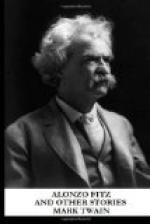To-day the population numbers ninety persons—sixteen men, nineteen women, twenty-five boys, and thirty girls—all descendants of the mutineers, all bearing the family names of those mutineers, and all speaking English, and English only. The island stands high up out of the sea, and has precipitous walls. It is about three-quarters of a mile long, and in places is as much as half a mile wide. Such arable land as it affords is held by the several families, according to a division made many years ago. There is some live stock—goats, pigs, chickens, and cats; but no dogs, and no large animals. There is one church-building used also as a capitol, a schoolhouse, and a public library. The title of the governor has been, for a generation or two, “Magistrate and Chief Ruler, in subordination to her Majesty the Queen of Great Britain.” It was his province to make the laws, as well as execute them. His office was elective; everybody over seventeen years old had a vote—no matter about the sex.
The sole occupations of the people were farming and fishing; their sole recreation, religious services. There has never been a shop in the island, nor any money. The habits and dress of the people have always been primitive, and their laws simple to puerility. They have lived in a deep Sabbath tranquillity, far from the world and its ambitions and vexations, and neither knowing nor caring what was going on in the mighty empires that lie beyond their limitless ocean solitudes. Once in three or four years a ship touched there, moved them with aged news of bloody battles, devastating epidemics, fallen thrones, and ruined dynasties, then traded them some soap and flannel for some yams and breadfruit, and sailed away, leaving them to retire into their peaceful dreams and pious dissipations once more.
On the 8th of last September, Admiral de Horsey, commander-in-chief of the British fleet in the Pacific, visited Pitcairn’s Island, and speaks as follows in his official report to the admiralty:




